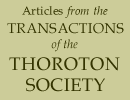South Leverton
By The Rev. A. E. CLARKE.

All Saints' church, South Leverton (A P Nicholson, 2001).
There would seem to have been a church here in Saxon times, for we find that William Rufus gave the church of All Hallowes, of South Leverton, to the church of St. Mary, of Lincoln, and Robert, the bishop of that church, for the soul of his father, and of his mother and his son, and all things which belonged to the said church in the time of King Edward (the Confessor). It was afterwards appropriated to the deanery of Lincoln. At the enclosures in 1797, 380a., 2r. 30p.were granted to the dean of Lincoln, and 56a. 3r. 15p. to the vicar.

Arcade, South Leverton.

Pier in North Arcade, South Leverton.
Of the older church nothing seems to be left. As it now stands it presents many good features of various periods. The greater portion of the tower, with the beautiful doorway in the south side of the nave, and the tub font, are the oldest parts of the existing church, late, Norman, about 1180. Next in age, Early English, about 1220, come the beautiful nave arcades, consisting of three wide arches on each side, supported by octagonal pillars resting on moulded bases, banded in the middle, and terminating in finely calved capitals The nail head ornament, which disappeared about this time, is seen here.
The chancel, to which there is no arch, is of the same period as the aisle arcade. This was re-built in 1868, precisely as before, with the exception of the three lancet windows at the east end, in place of the former, debased window. It has four lancet windows in the north and south walls, and a priest’s doorway in the south wall.
There is an aumbrey, or perhaps a piscina, in the south wall, and also an arched recess, that may have once been a sedilia.
The south aisle comes next as to age, about 1300, and served as a chantry chapel, the piscina of which still remains. Here there are three large geometrical windows. A large gargoyle is worthy of notice, as is also a portion of an arch in the west wall.
The north aisle, about 1340, has some square-headed curvilinear windows, and an ogee-arched doorway in its side waIl. The vestry corresponds with the old lean-to feature on the other side of the tower. Here we have a portion of what appears to have been an aumbrey and the lower part of a monumental slab, shewing feet and shroud rudely carved. There is also a large stone slab in the tower, and fragments of old incised crosses and tombs have been let into the walls in various parts. The battlements of the tower date from the 15th century.
There are three bells in the tower, with a Latin inscription and the date 1634 on each.
The church was restored twice during last century— 1847 and 1897—when many memorial stones of former vicars and of leading inhabitants were apparently destroyed.
A silver chalice with lid bears the date 1571.
The registers date from 1658.

South door, South Leverton.
The following extract is from the Torre MSS.—” Most of this town of South Leverton was of the fee of Roger de Bush or ancient demesne as soc to the King’s Great Manor of Maunsfield, and held by several freeholders, as the family of Musters held 13 oxgangs. And in the 22 Henry III. this manor was granted to Henry de Hastings and Ada his wife, with which family it descended. And a fair house and demesnes, with divers farms here, heretofore the inheritance of Nevill of South Leverton, were sold by the Nevills, then of Mattersey, unto the Earl of Kingston, with whom posterity it continued.”
This was the last place visited, and Retford station’ was reached just in time to catch the train a few minutes before six o’clock.
